研究生英语考试文章总结summary writing如何写汇编
最新研究生英语考试文章总结summary writing如何写

❖ Lack of clean water further adds to women's burdens: many of them have to spend as much as three or more hours just to fetch water,putting them at great risk of developing various diseases, further depriving them of the time avalable to better their life financially and emotionally.
❖ In the process of urbanization, many women are left behind to take care of everything single-handedly. Those who migrate to cities face new challenges as well, like economic exploitation and meanly living conditions.
武汉大学研究生英语summary写作范文(原文及范文)

WritingDirections: For this part, you are to write a summary of either of two articles that are presented to you in the following. Your summary should be 150-200 words. Remember to write neatly.Science and HumanityThe twentieth century saw more momentous change than any previous century: change for better, change for worse; change that brought enormous benefits to human beings, change that threatens the very existence of the human species. Many factors contributed to this change but—in my opinion—the most important factor was the progress in science.Academic research in the physical and biological sciences has vastly broadened our horizons; it has given us a deep insight into the structure of matter and of the universe; it has brought better understanding of the nature of life and of its continuous evolution. Technology—the application of science—has made fantastic advances that have affected us beneficially in nearly every aspect of life: better health, more wealth, less drudgery (单调沉闷的工作), greater access to information.Sadly, however, there is another side to the picture. The creativity of science has been employed to the detriment(损害) of mankind. The application of science and technology to the development and manufacture of weapons of mass destruction has created a real threat to the continued existence of the human race on this planet. We have seen this happen in the case of nuclear weapons. Although their actual use in combat has so far occurred only in 1945—when two Japanese cities were destroyed—during the four decades of the Cold War, obscenely huge arsenals(武器库) of nuclear weapons were accumulated and made ready for use. The arsenals were so large that if the weapons had actually been detonated (爆炸) the result could have been the complete extinction of the human species, as well as of many animal species.William Shakespeare said: "The web of our life is of a mingled (混合的) yarn, good and ill together. " The above brief review of the application of only one strand of human activities—science—seems to bear out this adage (格言). But does it have to be so? Must ill always accompany good deeds? Are we biologically programmed for aggression and war?I am not an authority in genetics, but from my readings and life-long observation I do not see any evidence that we are genetically condemned to commit evil. On the contrary, on very general grounds I would say that genetically we are destined to do things that are of benefit to the human species, and that the negative aspects are mistakes, transient errors in the process of evolution. In other words, I believe in the inherent goodness of Man.We are thus faced with a daunting (威吓,使胆怯) dilemma. As a process of natural evolution, science should be allowed to develop freely, without restrictions. But can we afford the luxury of uninhibited research in the natural sciences, with its awesome (可怕的) potential of total destruction, in a world in which war is still a recognized social institution?The preservation of the human species and its continuing enhancement demand that we learn to live with one another in peace and harmony. But this learning process has been slow and arduous (费力的), and is not yet complete. Due to the harsh conditions under which primitive man lived, he often had to fight with other human beings for survival. Individual killing and, later, collective killing—war—thus began to be seen as a natural phenomenon.We are still not organized for a war-free world. But in the meantime, the human species may be brought to an end by the use of the tools of destruction, themselves the product of science and technology.In my opinion, the problem has to a large extent arisen from the uneven rate of advance in thedifferent areas of human activities, in particular, between the progress in the natural sciences—which include the physical and biological disciplines, and the various social sciences—economics, sociology, politics (with psychology perhaps at the interface between the two major groups). Undoubtedly, there has been much faster progress in the natural sciences than in the social ones.Why have the natural sciences, especially the physical sciences, advanced so much faster than the social sciences? It is not because physicists are wiser or cleverer than, say, economists. The explanation is simply that physics is easier to master than economics. Although the material world is a highly complex system, for practical purposes it can be described by a few general laws. The laws of physics are immutable (不可改变的). They apply everywhere, on this planet as well as everywhere else in the universe, and are not affected by human reactions and emotions, as the social sciences are.How can we tackle this unevenness in the rate of progress of different.areas of science? Two ways come to mind:one, by accelerating the rate of progress in the social sciences; two, by slowing down the rate of advancement of the natural sciences in some areas, for example, by the imposition of ethical codes of conduct.Clearly, the former is by far the preferable way. What we would like to see is faster progress in the social sciences, leading to the establishment of a social system which would make war not only unnecessary but unthinkable; a system in which the existence of old, or the invention of new, weapons of mass destruction, would not matter, because nobody would dream of using them; a system in which people will be able to say: “nuclear weapons: who cares?”Responsibility for one's actions is, of course, a basic requirement of every citizen, not just of scientists. Each of us must be accountable for our deeds. But the need for such responsibility is particularly imperative for scientists, if only because scientists understand the technical problems better than the average citizen or politician. And knowledge brings responsibility.In any case, scientists do not have a completely free hand. The general public, through elected governments, have the means to control science, either by withholding (抑制) the purse, or by imposing restrictive regulations harmful to science. Clearly it is far better that any control should be exercised by the scientists themselves, through a self-imposed code of conduct. The establishment of an ethical code of conduct for scientists is an idea whose time has come.Summary:Science and HumanityThe twentieth century has made greater change to the world, which was brought by the progress in science, than any previous century. Unfortunately, not all these changes did good to the human society. Some of them have done serious damage to mankind and have been even predicted to destroy the whole world someday if out of control. In fact, mankind is not biologically programmed for violent behaviors like war. People are faced with a dilemma in which we would like to see science develop freely, but cannot afford the result of that. It is a basic instinct that man tends to protect oneself by fighting with others. The progress in the nautral sciences is much faster than that in social sciences because laws in natural sciences are immutable and apply everywhere and are not affected by human reactions and emotions. For even developmemt and for a better future of mankind, imposition of ethical codes is necessary. Everyone should be responsible for his behavior, especially the scientists. (166 words)China Sees Opportunities in Climate ChangeUNLIKE America’s leaders, China’s bosses are not much troubled by recalcitrant(顽强的)legislatures. The government has therefore had no difficulty in executing a smart volte face(完全改变)on climate change. Around three years ago its fierce resistance to the notion of any limit on its greenhouse-gas emissions started to soften. It now seems to be making serious efforts to control them.One reason for this change is the country’s growing awareness of its vulnerability to a warming world. The monsoon(季风)seems to be weakening, travelling less far inland and dumping its rainfall on the coasts. As a result China is seeing floods in the south-east and droughts in the north-west. At the same time the country’s leaders are deeply concerned about the melting of the glaciers on the Tibetan plateau, which feed not just the Ganges, the Indus, the Brahmaputra and the Mekong but also the Yangzi and Yellow rivers .A second reason is China’s growing sense of global responsibility. The country is not only the world’s largest emitter of greenhouse gases; it now regards itself, and is regarded, as one of the w orld’s leading powers, and therefore expects to work with the other big powers to tackle global problems such as the economic crisis, nuclear proliferation(核扩散)and climate change.A third reason is energy security. Although China has large coal reserves, it is also a big importer. Concerns about excessive dependence on foreign fossil fuels sharpened when China’s oil imports rocketed and, in 2005, the attempt by CNOOC(China National Offshore Oil Corporation), China’s largest offshore oil and gas company, to buy America’s Unocal was rebuffed. China’s push into nuclear and renewable energy has been driven by its need to diversify its energy sources.The fourth reason is economic. The Kyoto protocol has given China an incentive to clean up its act. China has received $2 billion through the CDM(Clean Development Mechanism) for cleaning up its industrial processes and building clean-energy capacity—half the money that has flowed through the CDM. That is expected to rise to $8 billion by 2012.But a longer-term economic motive springs from a shift in the way China thinks about growth. In the past, its all-out drive for growth has led it to rebuff pressure to cut emissions. Attempts to control pollution foundered on the performance-assessment system for officials at all levels of government, which prioritises growth. But that has been adjusted to encourage energy efficiency, and at the same time the leadership has started to argue that growth and greenery are compatible.Since Wen Jiabao took over as prime minister, the leadership has tried to define economic growth as something broader and longer-term than GDP figures imply: the emphasis has been on a “harmonious society” and “scientific development”. Nobody was sure what the latter meant, but Mr Wen has recently been talking about a more “resource-efficient environmentally friendly society” and Hu Jintao, the president, has referred several times to a “low-carbon economy” and a “green economy”.Local pollution may help to explain the shift. Residents are infuriated by filthy air and water that kills people and damages unborn children. Policies to cut carbon-dioxide emissions—through reducing the energy used to produce goods—can help clean up China’s cities at the same time.More interesting is the idea that clean energy might be a source of growth rather than a constraint on it. China, so the argument goes, missed out on the computer revolution. It makes hardware, but American firms own most of the valuable stuff—the intellectual property for the software. “You can’t get rich making socks and toys,” explains Lin Jiang, director of the China Sustainable Energy Programme at the Energy Foundation in San Francisco. “They’re looking for the next growth industry. Clean energy clearly has huge potential. And no country dominates the industry yet. It’s a wide-open field.” Hu Angang, an economist at Tsinghua University, calls this “a huge opportunity for China. The country will become the largest renewable-energy market, bio-energy market, clean-coal market, nuclear-power market, carbon-exchange market, environmental-technology market, low-carbon economy, exporter of low-carbon products and low-carbon-technology innovator.”The government is giving the economy a shove in that direction. In 2006 the five-year plan set a target for a 20% cut in the energy intensity of GDP by the end of 2010. The start was slow, but by the end of last year it had managed 10% and it now looks on track for its target. According to Mr Lin, that would mean a reduction in carbon emissions of 1.5 billion tonnes per year by 2010, more than the Waxman-Markey bill’s caps for domestic industry would take out of America’s economy by 2020. China has relatively tight vehicle fuel-efficiency standards . Electric vehicles are being generously subsidised ($8,800 for a car and $73,500 for a bus) and the government plans to build the capacity to produce half a million a year by 2012.The most visible changes have come in renewable energy. In 2005 the National People’s Congress passed legislation to offer subsidies for renewable energy—around twice the amount for coal. For wind energy, the target was set at 20GW of capacity by 2020. The subsidy generated so much building that China now expects to hit that target by the end of this year and is aiming for 150GW by 2020. “It’s like a gold rush right now,” says Mr Lin. The target for solar energy, similarly, has been raised from 1.8GW to 20GW by 2020.To put this in context, wind currently generates only 0.4% of Chinese electricity. Coal generates 80%. And, although China’s government does not have to jump the legislative hurdles faced by America’s president, it sometimes struggles to get policy implemented on the ground. Yet if China’s many layers of government can be persuaded that green means growth, they will cleave (坚持)to this policy; and the leadership seems keen to make that happen.China, thus, is after the same “green jobs” that Americans have been promised as part of their road to economic recovery. America has huge advantages in terms of technology and capital, but China has a couple of things going for it too: cheaper labour and a leadership unconstrained by the need to get re-elected every four years. China can play a long game, which helps when dealing with climate change.SummaryChina Sees Opportunities in Climate ChangeIn order to help deal with climate change, Chinese government made a smart change and will make serious efforts to control its greenhouse gas emissions. As a big importer of energy resources, with the raising awareness of its vulnerability to a warming world and the growing sense of global responsibility, with the incentive given by the Kyoto Protocol and $2 billion provided by the CDM for cleaning up its industry processes and building clean-energy capacity, this change is justified for China. Since China's leadership realized that growth and greenery are compatible and advocated to have a "low-carbon" and "green" economy, the government set a target of a reduction in carbon emissions of 1.5 billion tons per year by 2010 by tightening vehicle-efficiency standards and diversifying its energy sources, such as wind energy. Actually, the practice of "green jobs" is a great opportunity for China to clean up its cities and build clean-energy capacity. In the long run, China will become the largest renewable energy market in the world. With cheaper labours and a stronger leadership, China can play a long game in dealing with climate change. (187 words)。
英文summary撰写指导(精选5篇)

英文summary撰写指导(精选5篇)第一篇:英文summary撰写指导怎么写SUMMARY摘要(summary)是一种对原始文献(或文章)的基本内容进行浓缩的语义连贯的短文。
它以迅速掌握原文内容梗概为目的,不加主观评论和解释,但必须简明、确切地表述原文的重要内容。
摘要写作(summary writing)是一种控制性的作文形式,它能使学生通过阅读原文,吸收原文的文章结构与语言方面的长处,写出内容一致、结构近似、语言简洁的短文。
另外,对培养学生善于抓住文章重点的能力也有很大帮助,有利于他们在实际写作中避免面面俱到,事无巨细,一一罗列的不良倾向。
这种写作既要准确理解原文,又要能综合概括;既能培养欣赏能力,又能训练书面表达能力。
因此,用英文写摘要,对学习英语写作的学生来说,不失为一种切合实际的方法。
下面谈谈怎么写好英文摘要。
1)细读原文。
首先要仔细阅读全篇作品,然后对作品进行整体分析,掌握原文总的意思和结构,明确全文的主题(the maintheme)和各段的段落大意(the main idea)。
2)弄清要求。
搞清楚是写全文概要,还是写某一部分的概要,或者就某些问题写出要点。
3)列出原文要点。
分析原文的内容和结构,将内容分项扼要表述并注意在结构上的顺序。
在此基础上选出与文章主题密切相关的部分。
4)草拟写作提纲并写出初稿。
将挑选出的要点作为框架草拟详细的提纲,以所列的提纲为依据写出摘要的初稿。
在写作时要特别注意下面几点:(1)摘要应包括原文中的主要事实(main facts);略去不必要的细节(unnecessary details)。
(2)安排好篇幅的比例。
摘要应同原文保持协调,即用较多的文字写重要内容,用较少的文字写次要内容。
(3)注意段落的连贯和句子的衔接。
要用适当的转折词语贯通全文,切忌只简单地写出一些互不相干的句子。
(4)尽可能用自己的话来写,但不排斥用原文的某些词句。
(5)计算词数,看是否符合规定的词数要求。
研究生英语summary万能模板
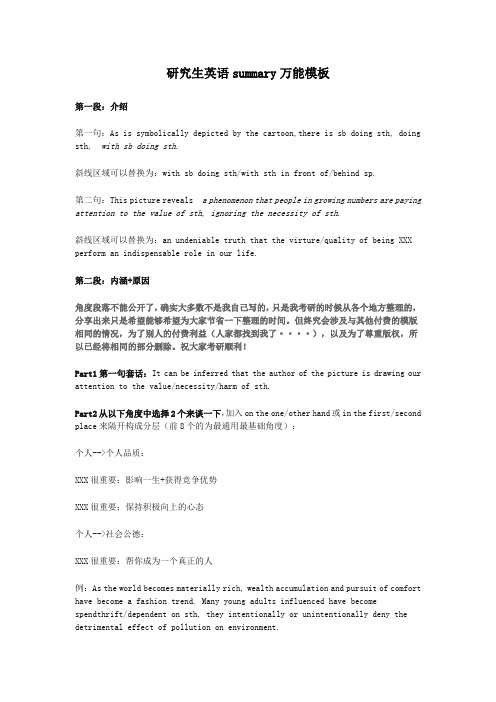
研究生英语summary万能模板第一段:介绍第一句:As is symbolically depicted by the cartoon,there is sb doing sth, doing sth, with sb doing sth.斜线区域可以替换为:with sb doing sth/with sth in front of/behind sp.第二句:This picture reveals a phenomenon that people in growing numbers are paying attention to the value of sth, ignoring the necessity of sth.斜线区域可以替换为:an undeniable truth that the virture/quality of being XXX perform an indispensable role in our life.第二段:内涵+原因角度段落不能公开了,确实大多数不是我自己写的,只是我考研的时候从各个地方整理的,分享出来只是希望能够希望为大家节省一下整理的时间。
但终究会涉及与其他付费的模版相同的情况,为了别人的付费利益(人家都找到我了····),以及为了尊重版权,所以已经将相同的部分删除。
祝大家考研顺利!Part1第一句套话:It can be inferred that the author of the picture is drawing our attention to the value/necessity/harm of sth.Part2从以下角度中选择2个来谈一下,加入on the one/other hand或in the first/second place来隔开构成分层(前8个的为最通用最基础角度):个人-->个人品质:XXX很重要:影响一生+获得竞争优势XXX很重要:保持积极向上的心态个人-->社会公德:XXX很重要:帮你成为一个真正的人例:As the world becomes materially rich, wealth accumulation and pursuit of comfort have become a fashion trend. Many young adults influenced have become spendthrift/dependent on sth, they intentionally or unintentionally deny the detrimental effect of pollution on environment.XXX很重要:随着物质丰富,人们忽视可XXX的影响第二段补充:如果发现第二段感觉字数不够,可以用以下“套话”嵌入增加字数。
考研英语小作文写作总结

考研英语小作文写作总结Title: Summary of Writing for Postgraduate English Essay。
Writing essays is an essential part of the postgraduate entrance examination. It requires candidates to demonstrate their ability to express ideas clearly and logically, as well as to analyze and argue effectively. In order to succeed in the exam, candidates need to master the skills of essay writing and practice regularly. In this essay, we will summarize the key points of writing for the postgraduate English essay.First of all, it is important to understand the requirements of the essay question. Candidates should carefully read the question and identify the key pointsthat need to be addressed. They should also pay attention to the instructions given, such as word limit, format, and style. By understanding the requirements, candidates can structure their essay effectively and ensure that theyanswer the question comprehensively.Secondly, candidates should organize their ideas logically. A well-structured essay should have a clear introduction, body, and conclusion. In the introduction, candidates should provide background information and state their thesis statement. In the body, they should present their arguments and evidence to support their thesis. Inthe conclusion, they should summarize their main points and restate their thesis. By organizing their ideas in this way, candidates can make their essay coherent and easy to follow.Thirdly, candidates should use appropriate language and style. They should avoid using jargon or complex vocabulary that may confuse the reader. Instead, they should use clear and concise language to convey their ideas effectively.They should also use appropriate grammar and punctuation to ensure that their essay is well-written and easy to read.By using the right language and style, candidates can makea good impression on the examiners and score high marks.In addition, candidates should practice writing essaysregularly. Writing is a skill that improves with practice, so candidates should set aside time to write essays on a regular basis. They can also seek feedback from teachers or peers to help them improve their writing skills. By practicing regularly, candidates can become more confident in their writing abilities and perform better in the exam.In conclusion, writing essays for the postgraduate English exam requires candidates to demonstrate theirability to express ideas clearly and logically. By understanding the requirements of the question, organizing their ideas effectively, using appropriate language and style, and practicing regularly, candidates can improve their writing skills and succeed in the exam. With determination and hard work, candidates can achieve their goal of entering a postgraduate program.。
研究生英语考试文章总结summary writing如何写共23页文档
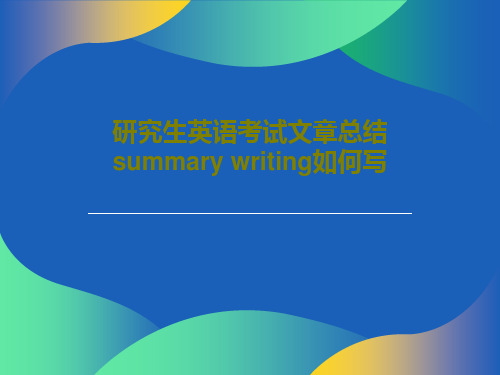
41、实际上,我们想要的不是针对犯 罪的法 律,而 是针对 疯狂的 法律。 ——马 克·吐温 42、法律的力量应当跟随着公民,就 像影子 跟随着 身体一 样。— —贝卡 ቤተ መጻሕፍቲ ባይዱ亚 43、法律和制度必须跟上人类思想进 步。— —杰弗 逊 44、人类受制于法律,法律受制于情 理。— —托·富 勒
45、法律的制定是为了保证每一个人 自由发 挥自己 的才能 ,而不 是为了 束缚他 的才能 。—— 罗伯斯 庇尔
16、业余生活要有意义,不要越轨。——华盛顿 17、一个人即使已登上顶峰,也仍要自强不息。——罗素·贝克 18、最大的挑战和突破在于用人,而用人最大的突破在于信任人。——马云 19、自己活着,就是为了使别人过得更美好。——雷锋 20、要掌握书,莫被书掌握;要为生而读,莫为读而生。——布尔沃
END
研究生英文总结范文
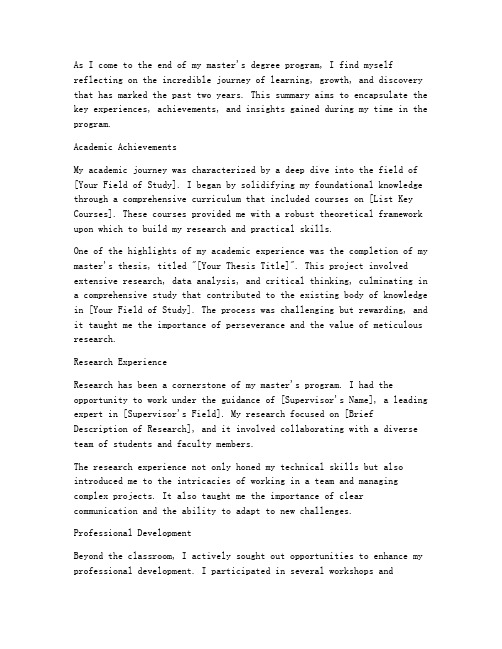
As I come to the end of my master's degree program, I find myself reflecting on the incredible journey of learning, growth, and discovery that has marked the past two years. This summary aims to encapsulate the key experiences, achievements, and insights gained during my time in the program.Academic AchievementsMy academic journey was characterized by a deep dive into the field of [Your Field of Study]. I began by solidifying my foundational knowledge through a comprehensive curriculum that included courses on [List Key Courses]. These courses provided me with a robust theoretical framework upon which to build my research and practical skills.One of the highlights of my academic experience was the completion of my master's thesis, titled "[Your Thesis Title]". This project involved extensive research, data analysis, and critical thinking, culminating in a comprehensive study that contributed to the existing body of knowledge in [Your Field of Study]. The process was challenging but rewarding, and it taught me the importance of perseverance and the value of meticulous research.Research ExperienceResearch has been a cornerstone of my master's program. I had the opportunity to work under the guidance of [Supervisor's Name], a leading expert in [Supervisor's Field]. My research focused on [Brief Description of Research], and it involved collaborating with a diverse team of students and faculty members.The research experience not only honed my technical skills but also introduced me to the intricacies of working in a team and managing complex projects. It also taught me the importance of clear communication and the ability to adapt to new challenges.Professional DevelopmentBeyond the classroom, I actively sought out opportunities to enhance my professional development. I participated in several workshops andseminars, including those on [List Relevant Workshops or Seminars]. These experiences provided me with practical skills and industryinsights that are invaluable for my future career.Additionally, I took on a teaching assistantship for a course in [Course Name]. This role allowed me to apply my knowledge in a teaching context, helping me develop my pedagogical skills and my ability to communicate complex concepts effectively.Personal GrowthThe master's program has been a transformative experience on a personal level as well. I have learned to manage my time more efficiently, tothink critically and analytically, and to approach challenges with a positive attitude. These skills have not only improved my academic performance but have also prepared me for the professional world.Future GoalsLooking forward, I am excited about the opportunities that lie ahead. I plan to pursue a career in [Your Desired Field], where I hope to apply the knowledge and skills I have acquired during my master's program. My ultimate goal is to make a meaningful contribution to the field of [Your Field of Study] and to continue my professional development through ongoing research and learning.In conclusion, my master's degree program has been an enriching and transformative experience. It has equipped me with the academic foundation, research skills, and professional competencies necessary to excel in my chosen field. I am grateful for the support of my professors, peers, and mentors, and I look forward to applying the lessons learnedto the next chapter of my life.。
研究生英语考试文章总结summarywriting如何写演示文稿

❖ Lack of clean water further adds to women's burdens: many of them have to spend as much as three or more hours just to fetch water,putting them at great risk of developing various diseases, further depriving them of the time avalable to better their life financially and emotionally.
❖ In the process of urbanization, many women are left behind to take care of everything single-handedly. Those who migrate to cities face new challenges as well, like economic exploitation and meanly living conditions.
❖ Discriminatory inheritance, property ownership and limited access to agricultural support systems render women unable to ensure food safety, soil conservation and land sustainability.
❖ Disasters are more likely to strike poor women harder who live in poor-quality houses and disaster-prone areas. To make things worse,they are ill-informed and do not react as quickly as they should in an emergency due to the social restrictions on women about "propriety".
研究生英语summary范文

研究生英语summary范文In the realm of academia, the art of summarizing is a crucial skill that transcends disciplines. As a graduate student, mastering the ability to distill complex information into concise summaries is essential for both academic and professional success.Summarizing an English text requires a deep understanding of the material, the ability to identify key points, and the skill to present them in a coherent and succinct manner. It's about capturing the essence without losing the integrity ofthe original content.A well-crafted summary should be objective, avoiding personal opinions or interpretations. It should reflect the author's main arguments, findings, or themes, and bestructured in a way that is easy for readers to follow.In the context of English literature, a summary might highlight the central conflict, the development of characters, and the overarching themes of a novel. It should also respect the original author's voice and style, ensuring that the summary remains true to the source material.For academic papers, the summary must encapsulate the research question, the methodology, the findings, and the implications of the study. It should be written in a neutral tone, with a focus on clarity and brevity.In the business world, a summary of a report or proposal should outline the problem, the proposed solution, and the expected outcomes. It should be persuasive, yet concise, designed to inform and influence decision-makers.The length of a summary can vary, but it's generally shorter than the original text, often by half or even more. The key is to prioritize information, ensuring that every sentence contributes to the overall understanding of the material.Lastly, a good summary is not a substitute for reading the original text. It serves as a tool for quick reference, a way to refresh one's memory, or to provide an overview for those who may not have the time to delve into the full text.In conclusion, the summary is a versatile tool in the graduate student's toolkit. Whether for academic papers, literature reviews, or professional reports, the ability to summarize effectively can enhance one's communication skills and contribute to the clarity of one's academic and professional endeavors.。
研究生英语考试文章总结summarywriting如何写专选课件
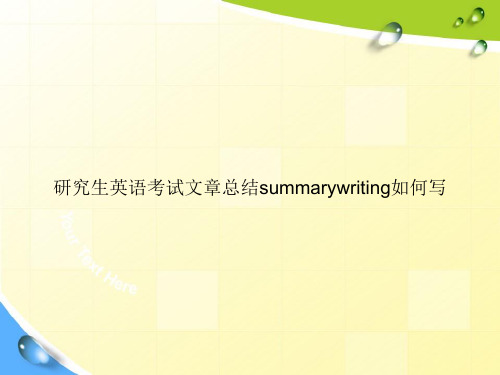
❖ The writer finds that women are unequal to men in every way. (They are underprivileged and put under social and moral restrictions. )He believes that an exploration into biomass energy can shed light on the synergy between gender, poverty and environment issues.
❖ Disasters are more likely to strike poor women harder who live in poor-quality houses and disaster-prone areas. To make things worse,they are ill-informed and do not react as quickly as they should in an emergency due to the social restrictions on women about "propriety".
❖ The writer calls for forward-looking strategies to integrate gender into environmental analysis. To be more specific: Allow more participation in environmental policies and actions on women's part; put the government priority on fostering gender equity and subsidize it; resort to a scientific paradigm as well as a social approach in the environmental analysis.
研究生英语考试文章总结summarywriting如何写(汇总).ppt
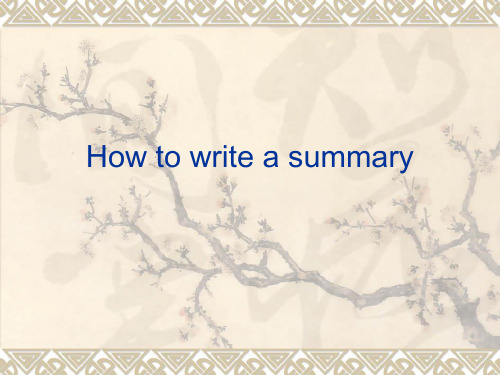
❖ The writer calls for forward-looking strategies to integrate gender into environmental analysis. To be more specific: Allow more participation in environmental policies and actions on women's part; put the government priority on fostering gender equity and subsidize it; resort to a scientific paradigm as well as a social approach in the environmental analysis.
❖ Lack of clean water further adds to women's burdens: many of them have to spend as much as three or more hours just to fetch water,putting them at great risk of developing various diseases, further depriving them of the time avalable to better their life financially and emotionally.
❖ Disasters are more likely to strike poor women harder who live in poor-quality houses and disaster-prone areas. To make things worse,they are ill-informed and do not react as quickly as they should in an emergency due to the social restrictions on women about "propriety".
summary writing 英语作文写作技巧汇编
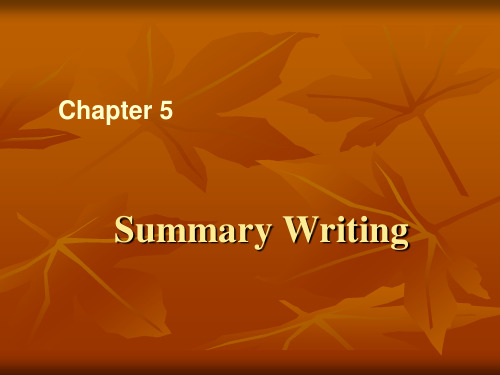
5. As you revise and edit your summary, compare it to the original and ask yourself questions such as: Have I rephrased the author’s words without changing their meaning? Have I restated the main idea and the supporting points accurately and in my own words?
1. You’ve cooked us all a hot potato. (a troublesome person or issue)
2. Prevention is better than cure. (预防胜于治疗。) (It is better to prevent something unpleasant from
III. Techniques in summary writing
1. Paraphrasing To paraphrase means to completely
and correctly express other people’s ideas in one’s own words.
Examples:
4. Learn the steps in summary writing 5. Practice
I. What is a summary?
A summary is a shortened passage, which retains the essential information of the original. It is a fairly brief restatement --- in your own words ---of the contents of a passage.
研究生英文总结汇报

研究生英文总结汇报IntroductionIn this report, I will summarize my research findings and present a comprehensive analysis of my graduate studies. The research I conducted aimed to investigate the impact of social media on consumer behavior and the effectiveness of different marketing strategies. This report will provide an overview of the research objectives, methodologies employed, key findings, and the significance of this study.Research ObjectivesThe main objective of the research was to explore the influence of social media on consumer behavior. This involved examining the role of social media in shaping consumer preferences, purchasing decisions, and brand loyalty. Additionally, the study sought to evaluate the effectiveness of various marketing strategies used on social media platforms, such as influencer marketing and user-generated content, on consumer engagement and purchase intentions.Methodologies EmployedTo achieve the research objectives, a combination of qualitative and quantitative methods were employed. Firstly, a literature review was conducted to provide a theoretical foundation for the study and to identify key trends and theories in the field of social media marketing. This was followed by the design of a survey questionnaire, which was distributed among a sample of consumers. The questionnaire consisted of both closed-ended and open-ended questions, allowing for both quantitative and qualitative data analysis.Key FindingsBased on the analysis of the collected data, several key findings emerged. Firstly, it was found that social media does have a significant impact on consumer behavior, with a majority of participants reporting that they are influenced by social media when making purchasing decisions. Additionally, the study revealed that consumers are more likely to trust recommendations from influencers and their peers when compared to traditional forms of advertising. This highlights the importance of incorporating influencer marketing and user-generated content into marketing strategies. Furthermore, the research found that interactive content, such as polls and quizzes, increases consumer engagement and purchase intentions.Significance of the StudyThis research contributes to the existing body of knowledge on social media marketing by providing empirical evidence on the influence of social media on consumer behavior and the effectiveness of marketing strategies. The findings can be used by marketers to refine their social media strategies and allocate resources effectively. Moreover, the study highlights the need for businesses to adapt to the changing landscape of marketing and embrace social media as a powerful tool for engaging with consumers.ConclusionIn conclusion, this research has shed light on the impact of social media on consumer behavior and the effectiveness of marketing strategies. The findings emphasize the importance of incorporatingsocial media into marketing campaigns and leveraging influencer marketing and user-generated content. As social media continues to play a significant role in consumers' lives, businesses must adapt their marketing strategies to remain competitive in the digital era. This study contributes to the understanding of social media's influence on consumer behavior and provides practical recommendations for marketers in harnessing the power of social media.。
- 1、下载文档前请自行甄别文档内容的完整性,平台不提供额外的编辑、内容补充、找答案等附加服务。
- 2、"仅部分预览"的文档,不可在线预览部分如存在完整性等问题,可反馈申请退款(可完整预览的文档不适用该条件!)。
- 3、如文档侵犯您的权益,请联系客服反馈,我们会尽快为您处理(人工客服工作时间:9:00-18:30)。
❖ Lack of clean water further adds to women's burdens: many of them have to spend as much as three or more hours just to fetch water,putting them at great risk of developing various diseases, further depriving them of the time avalable to better their life financially and emotionally.
How to write a summary
❖ In the article,the writer argues that there are synergies between gender equity, poverty alleviation and environmental sustainability.
❖ At the same time, women become more vulnerable as victims of indoor air-pollution. They can access fewer resources of biomass energy due to privatization of communal lands.
❖ In the process of urbanization, many women are left behind to take care of everything single-handedly. Those who migrate to cities face new challenges as well, like economic exploitation and meanly living conditions.
❖ To begin with, environmental deterioration like deforestation reduces biomass energy dramatically, sending poor women to collect wood fuel for long hours instead of studying or working, perpetuating their poverty.
❖ Disasters are more likely to strike poor women harder who live in poor-quality houses and disaster-prone areas. To make things worse,they are ill-informed and do not react as quickly as they should in an emergency due to the social restrictions on women abouቤተ መጻሕፍቲ ባይዱ "propriety".
❖ Even in developed countries, they have to live with inequality in such realms as energy, education and labor division.
❖ The worsening environment and changing climate affect women negatively by increasing water scarcity,increasing the disease burden, etc. But women can help reverse the downward trend by taking public transportation more and promoting renewable energy.
❖ The writer calls for forward-looking strategies to integrate gender into environmental analysis. To be more specific: Allow more participation in environmental policies and actions on women's part; put the government priority on fostering gender equity and subsidize it; resort to a scientific paradigm as well as a social approach in the environmental analysis.
❖ The writer finds that women are unequal to men in every way. (They are underprivileged and put under social and moral restrictions. )He believes that an exploration into biomass energy can shed light on the synergy between gender, poverty and environment issues.
❖ Discriminatory inheritance, property ownership and limited access to agricultural support systems render women unable to ensure food safety, soil conservation and land sustainability.
❖ Unclean water, pollutants in the environment, climate changes and poor nutrition work together to pose a threat to women's health, espeacilly pregnant women.Ignorance of AIDS afflict many women in Africa, affecting agriculture in this land.
